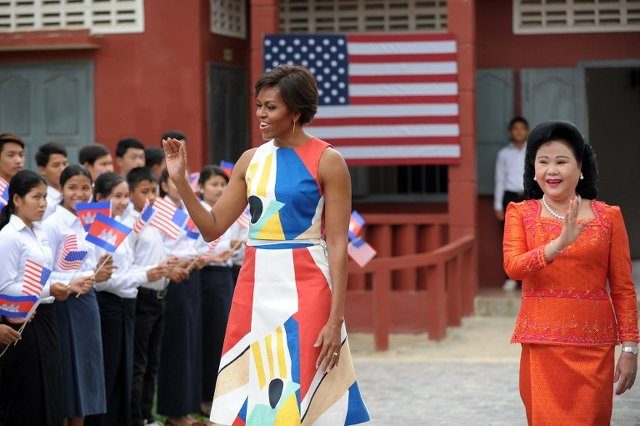SUMMARY
This is AI generated summarization, which may have errors. For context, always refer to the full article.

SIEM REAP, Cambodia – Michelle Obama called on schoolgirls to stay in school to push for equality and hold their leaders accountable on Saturday, March 21, during the first trip by a sitting US president’s wife to Cambodia.
The First Lady is visiting Cambodia — ruled by strongman Prime Minister Hun Sen for the last thirty years — to highlight what she has described as a “crisis” in women’s education with 62 million girls around the world denied schooling, primarily for economic or cultural reasons.
“When girls get educated, when they learn to read and write and think, that gives them the tools to speak up and talk about injustice and demand equal treatment,” she said in a speech to Peace Corps volunteers in Siem Reap.
“It helps them participate in the political life of their country and hold their leaders accountable,” she added.
Earlier in the day Obama — herself a Harvard-educated lawyer from a modest background — visited a school with the Cambodian premier’s wife Bun Rany to hear first hand from schoolgirls about the problems they face accessing education.
The pair were greeted by students dressed in crisp black and white uniforms who waved Cambodian and US flags, greeting the First Lady in carefully practised English.
Pressure from families
Some of the students described the difficulties they had staying in school, faced with long journeys to class and pressure from their families to find work or complete household chores.
“Everyday, I get up at 4:00 am to cook rice to bring to school,” one girl called Sohang told Obama. “It takes me one hour to ride a bicycle to school.”
Cambodia’s education system was ravaged in the 1970s during the Khmer Rouge’s brutal rule.
Huge numbers of intellectuals and teachers were killed as Pol Pot’s regime dismantled modern society in their quest for an agrarian Marxist utopia.
The traumatic period left the country impoverished and with an acute shortage of teachers, something that still haunts its education system to this day.
According to Cambodian government statistics 68 percent of children are enrolled in primary education, but this drops off to 17.7 percent by lower secondary and just 8.8 percent by upper secondary.
Room to Read, a charity involved in children’s education in Cambodia, says there are three times more boys than girls in school.
The US government has launched the “Let Girls Learn” initiative, which Obama is promoting during her trip. The programme will be run by Peace Corps volunteers in 11 countries and promote girls’ education.
Asia pivot
Before flying to Cambodia, the First Lady visited Japan, a major donor to the initiative.
Alongside Cambodia, the initial recipient countries are Albania, Benin, Burkina Faso, Georgia, Ghana, Moldova, Mongolia, Mozambique, Togo and Uganda.
The trip comes at a time when the White House is pursuing its foreign policy “pivot” towards Asia, seen by many as an attempt by Washington to counter China’s meteoric rise and increasing influence in the area.
Southeast Asia is a key component of that pivot and the Americans are keen to woo the region.
During President Obama’s last two trips to Asia, southeast Asia has featured prominently, including a 2012 visit to Cambodia — a country that was once secretly carpet bombed by the US.
White House officials said his wife’s trip is “meant to underscore the breadth of our interactions” within the region.
Hun Sen marked three decades in power in January and is regularly criticised by campaigners for ignoring human rights and stamping out dissent.
While it is unlikely Michelle Obama will bring up rights abuses, the White House has said she would “share American perspectives about education and good governance”. – Suy Se, AFP/Rappler.com
Add a comment
How does this make you feel?
There are no comments yet. Add your comment to start the conversation.